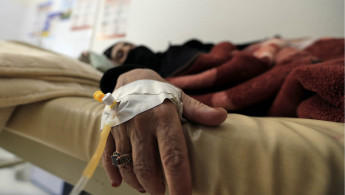Yemen at risk of another cholera outbreak, says UN
UNICEF Executive Director Henrietta Fore said in a statement the airstrikes earlier this week damaged a sanitation facility and a station that supplies most of the city's water.
Yemen has been devastated by a stalemated three-year civil war that has left around two-thirds of its 23 million relying on aid, and over 8 million at risk of starving.
"Two days ago, we received reports that a UNICEF-supported warehouse containing humanitarian provisions, including hygiene and water-related supplies, was hit by two airstrikes," Fore said.
She said a UNICEF-supported sanitation center in the district of Zabid in Hodeida came under attack on 28 July, damaging the facility's fuel tank. A day earlier, she said, the water station in the district of al-Mina, which provides Hodeida with most of its water, was hit.
"Attacks on water infrastructure jeopardize efforts to prevent another outbreak of cholera and acute watery diarrhea in Yemen," Fore said.
A previous cholera outbreak, which began in in October 2016 and escalated in April 2017, has killed more than 2,000 people and led to up to 1 million suspected cases in the country, according to the Red Cross.
Twitter Post
|
Yemeni government forces, backed by a Saudi-led coalition, have been advancing in Hodeida province in recent weeks as they battle the Houthi rebels. They are trying to retake the port city of Hodeida, through which Yemen relies on for most of its food imports.
Meanwhile, President Abed Rabbo Mansour Hadi arrived Wednesday in the country's easternmost province of al-Mahra to try to calm protests against the Saudi-led coalition, Yemeni officials said.
The officials said dozens of people have been protesting for days in al-Ghaydah, the main city in the province, against the presence of troops from Saudi Arabia.
The protesters want the troops to leave the city and hand control of the al-Ghaydah airport and the border crossing with Oman to civil authorities in al-Mahra.
The Houthis seized control of Sanaa in September 2014, and later pushed south toward the port city of Aden. The Saudi-led coalition entered the conflict in March 2015 and has faced criticism for a campaign of airstrikes that has killed civilians and destroyed hospitals and markets.
The Houthis, meanwhile, have laid land mines, killing and wounding civilians. They have also targeted religious minorities and imprisoned opponents. The stalemated war has killed more than 10,000 people.
Follow us on Twitter: @The_NewArab





 Follow the Middle East's top stories in English at The New Arab on Google News
Follow the Middle East's top stories in English at The New Arab on Google News
![Israeli forces ordered bombed Gaza's Jabalia, ordering residents to leave [Getty]](/sites/default/files/styles/image_330x185/public/2176418030.jpeg?h=a5f2f23a&itok=_YGZaP1z)

